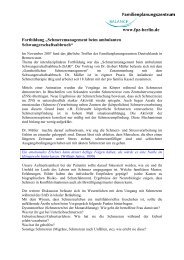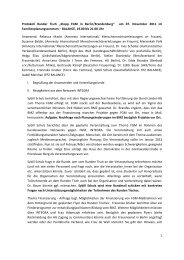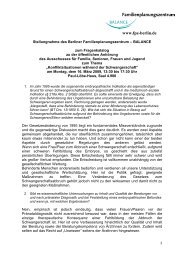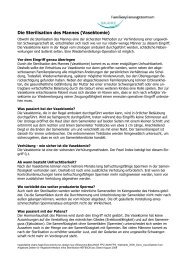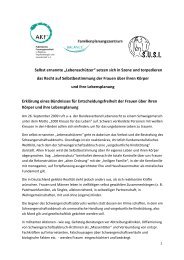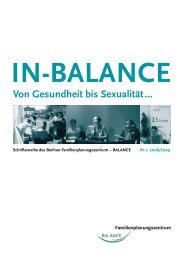Listening to African Voices - FPZ
Listening to African Voices - FPZ
Listening to African Voices - FPZ
You also want an ePaper? Increase the reach of your titles
YUMPU automatically turns print PDFs into web optimized ePapers that Google loves.
with roots in practicing groups could offer support in theform of of consultation hours.5.9. Perceptions and practices regarding health carepractices of <strong>African</strong> women immigrantsThis section is structured in two parts. The first paragraphoutlines the perceptions and practices as reported by <strong>African</strong>women immigrants. The second paragraph describes theperspectives of the gynaecologists interviewed.5.9.1. Perceptions and practices of <strong>African</strong> women immigrantsVery few women described (reproductive) health andsexual problems that they associated with FGM/C. One ofthe exceptions was a woman from Eritrea, who stated, forexample, that it was very painful for her <strong>to</strong> have a union withher husband and that she suffered from recurrent infectionsthat she believed <strong>to</strong> be associated with the FGM/C she hadundergone. A small number of women explained that theyexperienced sexual intercourse as frustrating as it did notgive them feelings of satisfaction or that the partner had<strong>to</strong> “work hard and for a long time” <strong>to</strong> get them sexuallyaroused. A few women also described that they had little orno interest in sex which was, however, not necessarily experiencedas a negative.When asked about reproductive health care practices, all keyinformants from the <strong>African</strong> community said that they eitherconsult a gynaecologists or go <strong>to</strong> a hospital. The main reasonfor visiting a gynaecologist was pregnancy. Some also citedreasons such as bladder infections or problems conceiving.Preventive care was cited only rarely.Their experiences with reproductive health care providerswere two-fold. Some women reported satisfaction with theservices and expressed trust in their doc<strong>to</strong>rs. Others felt thatthe health care workers <strong>to</strong>ok little time <strong>to</strong> listen <strong>to</strong> them and<strong>to</strong> explain the rationale of treatments.Several women who had undergone FGM/C felt that the<strong>to</strong>pic was dealt with inappropriately. As a consequence,they changed the doc<strong>to</strong>r – sometimes several times – andoften looked for gynaecologists of non-European origin. Onereason was the experience of curious or pitying reactions ofGerman health care workers. One participant of Burkinabeorigin described, for instance, that a German gynaecologist(a woman) looked at her with so much pity and irritation afterthe physical examination that she felt for the first time inher life that she was not normal. The gynaecologist did notaddress the issue of FGM/C, but the women felt that she wastreated like a victim who could not be talked <strong>to</strong> rationally.The participant decided after the treatment <strong>to</strong> abstain fromconsulting German doc<strong>to</strong>rs. Other women reported the lackof knowledge among German doc<strong>to</strong>rs about FGM/C. Theydescribed that their gynaecologists were only aware of themost extreme form of FGM/C (infibulation) and did not dealappropriately with less invasive types. A woman of Ethiopianorigin described how her gynaecologist did not see that shehad undergone FGM/C, but <strong>to</strong>ld her that she was lucky <strong>to</strong>have been spared from the practice:“I want <strong>to</strong> tell you my experience in Hamburg. The gynaecologistwho is my doc<strong>to</strong>r <strong>to</strong>ld me after her physical examinationthat I am lucky since I am not circumcised. I wassurprised but I didn’t dare tell her that I was circumcised.I think there is a misunderstanding about female circumcision.Most people know the film or the book entitledDesert Flower or Wüstenblume. I think this has misledthem. What is common in Ethiopia is not the one [form]mentioned in the book. Sewing or stitching the vagina aftercircumcision and not <strong>to</strong> let the child move for a certainnumber of days is not common in Ethiopia. I think the doc<strong>to</strong>rreferred <strong>to</strong> this type of circumcision. Yes, I am lucky I didnot have such an experience.” (woman of Ethiopia origin)5.9.2. Experiences of gynaecologists with <strong>African</strong> womenimmigrantsAmong the six interviewed gynaecologists, four claimed <strong>to</strong>have encountered few or no direct experiences with womenwho had undergone FGM/C. One of them was Dr. med CorneliaGoesmann 31 who, in collaboration with Prof. Dr. med.Heribert Kentenich, published the recommendations of theGerman Medical Association on how <strong>to</strong> treat women whohave undergone FGM/C. She reported that all efforts <strong>to</strong> gainaccess <strong>to</strong> the <strong>African</strong> community in Niedersachsen had beenwithout success and that she had never treated a womanwho had undergone FGM/C. Her conclusion was that <strong>African</strong>female immigrants from practicing countries probablyconsult their own doc<strong>to</strong>rs and avoid German gynaecologists.One other gynaecologist (also of German origin) had neverbeen in contact with women who had undergone FGM/Cdespite having participated in a training seminar on FGM/C.Two other gynaecologists claimed <strong>to</strong> have been consulted bya small number of affected women:• The first, a German gynaecologist, reported <strong>to</strong> have providedservices <strong>to</strong> two Ethiopian women who had undergoneFGM/C and• The second, a gynaecologist of Iranian origin, had many<strong>African</strong> patients, but had only met six women affectedby FGM/C (also mostly from Ethiopia) over more thantwo decades of practicing her profession. She had helpedone woman who suffered from complications due <strong>to</strong> aninfibulation. The other five women had undergone type Ior II and had no complications. She reported that <strong>African</strong>women rarely come for preventive care visits.<strong>Listening</strong> <strong>to</strong> <strong>African</strong> <strong>Voices</strong> 83






